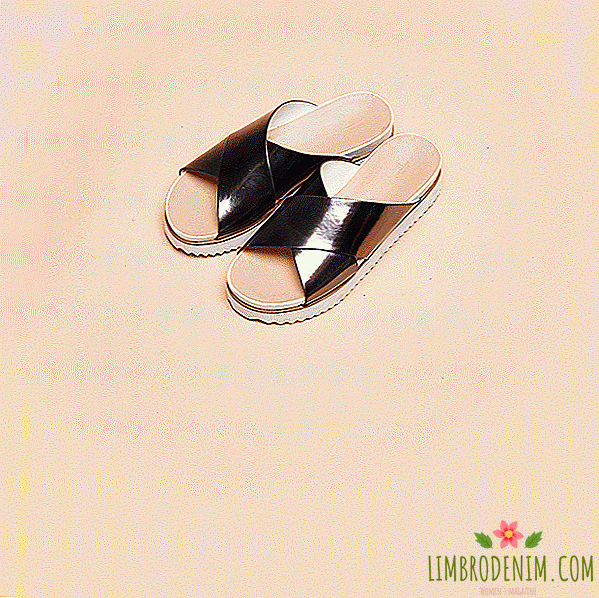"My mother is a monster": How and why mothers manipulate daughters
Katya's relationship with her mother has gone bad.when she was ten years old. Twenty-four years have passed - she moved to another city, found a job and a husband, but they still have conflicts, after which she feels as if she was betrayed. Katya constantly responds to her mother’s attempts to get close, even if she regrets it every time. When mom comes to visit, Katya feels uncomfortable. Her mother does not know what personal space is and how to treat the things of another person. She treats Kati’s adult body as a child’s body, as if there are no boundaries. Once Katya told her mother that she went to a psychologist, her mother said that only weak people would do that.

The relationship between mother and daughter is important not only because of objective biology, but also because it is thanks to the mother that the girl defines herself as a person, identifies herself in the outside world. “I deserve love”, “I am self-sufficient” - these are two formulas that a woman learns in a healthy relationship with her mother.
But often the relationship with the mother becomes a source of psychological trauma and difficulties in later life. Devaluation, manipulation, indifference, excessive control poison life and do not allow one to feel free and full-fledged person. Women solve this problem in different ways: someone tries to work on relationships, someone chooses to completely exclude the mother from her life.
"You do everything wrong"
"I am never right," says Katya. When she talks about work, personal life or just an unpleasant situation in the supermarket, her mother uses it to emphasize once again that Katya, unlike the people around her, is behaving incorrectly. And when she decides to tell something truly personal or sad, her mother reinterprets the story in such a way as to put Katya in a bad light, and then recalls this situation so that she can humiliate her again. "Money is the main criterion of success for my mother, while for me a little other things are important," says Kate. That is why her achievements and successes, and even marriage with a man whom she really loves, have no meaning for her mother. She only reminds Kate that this man can betray her at any time.
“Some mothers mistakenly believe that by striking their child more than the outside world can do, they will be able to prepare him for the trials and problems. Let him be bad, but at home, under my strict guidance,” says psychologist Viktor Zaikin. But such cruelty, as a rule, hurts and does not at all help to cope with difficulties, only increases self-doubt.
As a result, the daughter can strive to fully comply with her mother's ideas about a "worthy person" and think that only in this way can love be deserved. “As long as I am what my mother wants to see me, I get love and affection, and when I behave the way I want, I stop loving me,” the psychologist Daria Grosheva explains this model. The desire to prove to the mother its importance becomes a neurosis, and nothing but its approval can help calm down. Moreover, this injury can ruin relationships with other people and constantly remind the woman that only perfect behavior will ensure the love of others. She may feel that she is not entitled to respect and love, if she does not put effort into it.

"My mother always treated me like a defective piece. She never praised or supported me," says Sasha. From childhood, she tried to study perfectly well, write poetry, restore order at home, even if she was not asked to do so, as if trying to justify herself to everyone. When Sasha grew up, her mother began to try to seize the initiative to raise her children, because it seemed to her that she would cope with this better. "She constantly offered to take them away, ostensibly so that I could be alone with my husband," says Sasha. According to her, her mother allowed her grandchildren everything that she forbade and sought to undermine her authority. Sasha's mother never considered her a worthy man and mother for her children.
"If I were you, I would hang myself," said Masha's mom, once again criticizing her appearance and behavior. More than anything, the mother was afraid that Masha would "grow fat" and "never marry." When her expectations began to come true (Masha started having bouts of compulsive overeating under stress, after which the weight went up), the girl began to be led regularly to endocrinologists and traditional healers, but nothing helped. “I’m already thirty years old, but I still hear my mother say that no one will ever love me,” says Masha.
Oddly enough, says psychotherapist Dmitry Pushkarev, criticism most often comes from good motives. The mother may try to convey to the child the idea that without the efforts his life will not be successful. Often humiliating the child, the parent projects his own fears and concerns. "In Russia, it is generally accepted to criticize rather than praise. Moreover, parents often feel that the child is not trying hard enough, so the vicious circle of devaluation is sometimes difficult to break," says Pushkarev.
"I know what's best"
Depreciation is often accompanied by unhealthy control over the life of a girl. Often this happens because the mother does not understand that at some point the daughter should become independent and stand up for herself. “Many mothers are trying to stop the inevitable separation of the child. This situation becomes especially painful if the mother unconsciously wants to make the ideal person from the daughter,” says Viktor Zaikin.
The main problems with Lena’s mother began at seventeen. She did not eat meat, did not believe in God, and was not going to get married soon. "Then they began to force-feed me, drive me to a mosque under the threat of house arrest, so I realized that I had to keep my virginity before the wedding and soon find a husband. I even had some strange rituals to drive out the demons," Lena says. Then she fell in love with a classmate, and her mother reacted very badly. She took the phone from Lena, put her under house arrest and forbade her to go out. "This was justified allegedly by the fact that I need to prepare for the exam, and not think about boys," - explains the girl. Fortunately, she really managed to enter a prestigious university and leave, minimizing communication with her mother. “I very rarely go home, and by phone I report only about some domestic accidents. As soon as I start talking about something personal, a scandal happens, and my mother uses this information to manipulate me,” says Lena.
Mom entered Masha's room at any time, without knocking and without asking permission. “You have nothing of your own and it cannot be,” she replied to her indignation. Sometimes the mother would open the bathroom door with a knife when Masha closed to wash herself. “You're so helpless and you can't handle it yourself,” mothers who are mad about control usually explain their behavior. So, a mother can control her daughter's every step: decide what to wear, how to behave, where to study and work, who to meet, what time to return home and how to arrange things in the closet.
In response, the daughter has a firm conviction that she will not cope without instructions and advice from her mother. She begins to feel that she cannot take responsibility for her life, and she feels like a failure, which cannot take a step without someone's help. Mom, in turn, can revel in the feeling of power and at the same time wonder why her daughter had grown so hopeless.
"You are me"
From early childhood, my mother made Zhenya lose weight: in the course were convictions, scandals, tweaks for the stomach. For the first time, Zhenya felt fat at the age of six and got rid of it only after leaving her parents. “For a long time it seemed to me that my weight was a real problem. But then I began to analyze my mother’s unhealthy fixation on losing weight and realized that for me the figure and weight had never had such a value as for her. She lost twenty kilograms on cabbage of my own will, not I. Then I realized that my weight is a problem only for my mother and not for anyone else, ”says Zhenya. At that moment, she realized that she was not going to lose weight. This did not help to improve relations with the mother, but allowed to draw the line between imposed and own desires.
“I was brought up so that my mother could realize her ambitions,” writes one of the users of the Russian forum. Her mother set a clear plan for her: admission to the Faculty of Pharmacy, early marriage and two children. At first, she complied with the requirements: she participated in all sorts of olympiads that did not enthrall her, tried to succeed in studying against her will, but in the end she was confronted with clinical depression. “I immediately became a“ family shame ”because I dared to put my health above my mother's desires. One time I couldn’t literally get out of bed, but my mother still dissuaded me from going to a psychotherapist,” the girl writes. She never entered the university, but now she masters programming herself, just to break away from her family, where she constantly faces humiliations because of the reluctance to go to medical school.

“My mother is obsessed with horoscopes,” writes a twenty-two-year-old Reddit user. Her mother dictates what color her clothes should be, with which people she should communicate, how to talk to her parents. "She pretends to have learned all about me from predictions. And when I say that this is complete nonsense, she shakes her head and notes that this is exactly what the representatives of my zodiac sign behave like," the girl says.
The desire to control the daughter may be associated with a narcissistic trauma, says Viktor Zaikin. A mother can, consciously or unconsciously, project her unrealized desires onto the child, trying to make an improved copy of her daughter. To make going to a ballet, to demand excellent marks or to live exactly on a horoscope, to blame for the lack of friends - in general, try to correct your failures and shortcomings with the help of a child.
"You bother me"
Katya always noticed that her mother was jealous of all new men, or at least was suspicious of them. “But it’s more absurd that when she got a partner, she began to suspect that I was having sex with him,” she says. And when Katya moved to another city and returned home on business for a couple of weeks, her mother suggested that her move was related to the fact that she tried to hide her relationship with this person. “This is absolute nonsense! He completely did not correspond to my ideas about a suitable man for a relationship,” says Katia.
Competition is another unhealthy pattern in relationships that happens among mothers and daughters. Viktor Zaikin believes that mothers with a stagnant inferiority complex can behave this way. Feeling their own inconsistency, they are asserted against the background of a weaker and inexperienced person — for example, competing with their daughter or constantly feeling threatened by her. This model is especially common among mothers and daughters with a small age difference.
In childhood, Sasha became a victim of sexual violence. She was molested by her mother’s partner, threatening that if she didn’t "play" with him, he would leave them. Sasha hid this connection, but at some point she learned that the mother is aware and does not consider this a big problem. A few years later, when she had already left home, Sasha's boyfriend persuaded her to go to the police - during the investigation it turned out that her mother still meets with this person. “When we started talking, mom accused me of trying to take away from her a“ normal guy. ”Some nonsense said that they had love with him, but I interfered,” says Sasha.
"What's the difference?"
Competition can also be a consequence of a symbiotic injury (by analogy with Siamese twins), in which the mother begins to perceive the child as an extension of herself. “It is in this case that unnatural competition arises, or the mother considers it overwhelming to charge her daughter with unbearable duties. It turns out that the child practically loses her childhood and feels badly about her individuality,” says Viktor Zaikin.
According to psychotherapist Viktor Bogomolov, such relationships are most often due to difficult life circumstances. For example, if a mother is left alone with several children or is going through a difficult period in her life, because of what her daughter has to constantly support the mother or become a full-fledged nanny. This situation can be fixed, and as a result, the mother will perceive the child as an adult and make inadequate demands on it for the rest of her life.

A symbiotic injury often becomes a great scope for manipulation. A woman who, from early childhood, takes responsibility for household chores and other people, does not have time to realize her needs, boundaries and desires, says psychotherapist Olga Miloradova. Life for itself seems to her something vicious and selfish, so that it becomes vulnerable to any demands and manipulations from the mother. A daughter may not feel the boundaries between her own life and the needs of the family, so she will always feel obliged and guilty after another claim that she does not help her mother enough, and, as a result, she can be sure that without her everything will really go to waste. The substitution of roles does not allow her daughter to believe that the mother will cope with her life without her. She feels oppressive responsibility for the person who once could not take care of her.
“Recently, I was going to move in with my friend to another city,” writes one of the users of the Russian forums. When she said this to her mother, she began to choke and shake with her whole body — she said that the pressure had risen greatly. Mom threatened to die if her daughter left home. “I don’t want to become a mother’s killer, but I can’t continue living in such an addiction either,” says the girl
"You do not love me"
Zhenya cries very rarely, but her mother consistently manages to unbalance her. She had already learned to respond calmly to comments about excess weight, but she didn’t respond to ultimatums and tears. “Food is more expensive to you than mom. You would know what it was for me to give birth to you!”, “You cannot refuse sweet, because you do not love me,” the accusations about her sound like this. As a child, she secretly bought chocolates and threw candy wrappers under the bed to avoid scandal.
In this case, manipulation is associated with the desire to build the life of your child in accordance with their own ideas. In the case of Zhenya, the mother, with the help of guilt, is trying to maintain control of her daughter. Unwillingness to obey the mother is treated as indifference and inhumanity. In addition to speculating on her daughter's tender feelings, she also scares her with barely realistic developments and dangers: “You will never marry”, “Your friends communicate with you, only to look better on your background,” “I never thought that my the daughter will look like this. "
"When I was in school, my mom liked my classmate - such a star, clever and beautiful. Mom began to compare me with her at every turn," - says Lena. Sometimes mother criticized her features, comparing with this classmate, of course, not in favor of her daughter. "For me, this girl became a real idol. I made friends with her and tried to be like her in everything. I suffered a lot because I was not she and I couldn’t like my mom to the same extent." Since then, Lena became unsure of herself, and in her youth she hated herself so much that she even thought about suicide.
Banning yourself from being is another way that mothers use to subdue their daughter to their whims. With the help of a concrete example, a mother can impose certain values, goals, and ideals on her daughter, as if predetermining her life in advance. With such a manipulation, it is rather difficult to realize your own needs and get rid of the artificial standards created by the mother.
"Dislike"
“I wish I didn’t give birth to you,” as a rule, they throw this phrase in a fit of anger, and then regret it, but sometimes the mother can really dislike her child. Indifference, cruelty, desire to withdraw, lack of sympathy and empathy often testify to such a banal, but still rare phenomenon.
“Some women have postpartum depression because of which they cannot find the strength to love their baby,” says Viktor Zaikin. Usually, postpartum depression occurs in the first years after childbirth, but sometimes it remains for almost a lifetime. "This injury can remain with a woman if she is in difficult circumstances, because of which the child can begin to be associated with bad events and sensations, and not the joy of motherhood," explains the psychologist. In general, for women who have got a child in traumatic conditions, it may be more difficult to learn love - this will require some effort.
Sometimes, Zaikin says, mothers try to justify the cruel treatment and humiliation of their daughter by love, but, of course, this has little to do with the truth. В таких случаях чувства к ребёнку подавляются негативными эмоциями, связанными с его появлением. А обнаружить и взрастить положительные эмоции к ребёнку становится сложной задачей. "Мама не может меня принять, потому что я похожа на своего отца.She used to quite often disdainfully mentioned how one or another of my gestures or actions resemble his behavior, "says Olya. Over time, she learned to fight off such claims, and now she learns to build boundaries in relations with her mother.

According to the psychotherapist Dmitry Pushkarev, sometimes mothers may feel a sense of love for their child, but still unconsciously use it for their own purposes, turning the daughter into a means for self-regulation or a tool in the war with her spouse. For example, to associate the bad behavior of the daughter with her similarity with the father. “It helps, firstly, to disclaim responsibility for the flaws in upbringing, and secondly, to find another proof of the validity of their dislike for the partner,” he said. This is a destructive message regarding the daughter, because she did not choose her father and could not choose who she was like. The conscious or unconscious use of a child can also be manifested in the desire to realize their ambitions through the child, emotional breakdowns, using the child as an ally against a partner or a “vest for comfort”, parental sacrifice and hyperthreading, in which the mother does not give her daughter and step on her own.
It is important to understand the difference between the two types of parental love, says Pushkarev. The first is love as a tender feeling, the second is a rational desire for the good of your child and an understanding of its autonomy. For example, many young mothers, especially single mothers, sincerely desiring the good for their child, cannot experience tender feelings towards him, which is not surprising given the enormous stress that accompanies the first months and sometimes the years of motherhood with the modern lifestyle. “Such mothers, sincerely wanting good for their child, often blame themselves for being“ not in love ”, that they are“ bad mothers. ”Fortunately, this is usually unreasonable, and the feeling of love for a child wakes up after a few months or years as life becomes more or less normalized and the level of stress decreases, ”says Pushkarev. But it happens the other way around - the mother may not care for the soul in the daughter, but does not understand that the child is an autonomous person with his needs.
"I look like my mother!"
Most of all, Sasha is frightened that in relation to her children she sometimes repeats the behavior of her mother. She tries to work this problem with a psychotherapist. In general, the fear of becoming like her mother is completely normal to a certain extent, Zaikin said: "This is the first stage of gaining independence and individuality. Teenage girls often deliberately try to differ from the mother in appearance by choosing brighter clothes or bold hairstyles." But in a healthy relationship, an obsessive desire to differ from mom should subside over time.
Usually, daughters are afraid to start copying those features of mother's behavior that give them the most unpleasant emotions. Although, according to Bogomolov, they are more likely to manifest themselves: "Girls learn certain styles of thinking, ways of explaining reality and managing their emotions with their parents." Often this can affect their future life. Suppose a woman can learn from a mother who is paranoid not to trust people or to shift responsibility for her offenses to another person. “The moment of insight came when I met a man who was pathologically similar to my mother. I constantly tried to earn his trust and justified myself,” Olya says. In this relationship, she did not have the right to vote and constantly faced bans - just like in childhood.
True, the good news is that people have different abilities to recover in case of trouble and to react to dysfunctional family relationships, says Victor Bogomolov. So many can be completely resistant to the moral traumas inflicted by the mother, and successfully build their lives further.
Often, wanting to leave a traumatic experience behind, women decide to completely stop communicating with their mother. However, according to psychologists, such an act does not always help to overcome injury. Realizing that the relationship with her mother will never be perfect, you should first define your own boundaries, and then try to maintain contact with her within reasonable limits. Firstly, it is worth accepting that a mother is also a living person who can make mistakes and refuse an idealized image, Daria Grosheva believes. And secondly, keep in mind that adult-formed people can change only if they themselves want to work on relationships. Otherwise, you should learn to appreciate and protect your autonomy and prevent the mother from trying to influence your life against the desire to go on about her.
Images: cherezoff - stock.adobe.com





